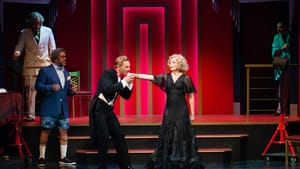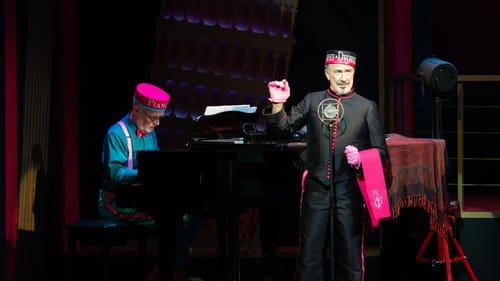Stay in the Loop
BSR publishes on a weekly schedule, with an email newsletter every Wednesday and Thursday morning. There’s no paywall, and subscribing is always free.
Choppy seas for a rare farce
Resident Ensemble Players presents Tom Stoppard’s Rough Crossing

Steve Tague and his Resident Ensemble Players (REP) must have intuited that as unexpectedly warm weather gave way to fall, a farce would be just what we needed. But this production of Rough Crossing hits choppy seas and never quite makes home port.
Set in the 1920s, Tom Stoppard’s 1984 play features a troupe of theater folk cobbling together a musical production (a la Fred Astaire and Ginger Rogers) starring the not-so-bright Ivor (Mic Matarrese) and the diva Natasha (Elizabeth Heflin), who were formerly lovers. The show is being created by Turai (Stephen Pelinski) and Gal (Hassan El-Amin), successful playwrights and producers who have worked together for 20 years. Suffering from writer’s block and sequestered aboard the luxury liner SS Italian Castle, they are desperately trying to complete some semblance of a script before the ship docks in New York.
Music for their show is being created by wunderkind composer Adam (Michael Gotch), now engaged to the leading lady and suffering from a mysterious malady. Attempting to surprise their two actors, this trio comes aboard and overhears Ivor and Natasha in what seems like a tryst. To save the situation, Turai insists that this was merely a rehearsal, assisted (sometimes stymied) in his increasingly desperate shenanigans by omnipresent ship steward Dvornichek (Lee E. Ernst).
Out-Stopparding Stoppard?
What could possibly go wrong? This being farce, everything—including, unfortunately, a good bit of this particular production. Stoppard freely adapted his script from Ferenc Molnár’s 1926 Hungarian farce Jatek a Kastelyban (Play at the Castle). Most people today are unfamiliar with Molnár, a novelist, short story writer, and playwright highly praised and highly visible in the New York theater world of the 1910s and 1920s—his play Liliom was adapted by Rogers and Hammerstein as their musical Carousel.
While this production, directed by Ian Belknap, lists toward comedy, it never really sets sail. The production often comments on itself rather than living inside the farcical world that Stoppard (and Molnár) created. Since Stoppard is commenting on the intricacy of that 1920s farce, and Molnár, in turn, is commenting on the society around him, as Belknap consistently (or inconsistently) tries to out-Stoppard Stoppard (something nearly impossible), the farcical forward motion is often scuttled.
These REP actors know how to handle farce, which makes this muddled production all the more unexpected. Heflin has adeptly nailed the style, and Ernst’s consistent misinterpretations as the steward are well-realized, but the other actors seem to juggle and struggle. It doesn’t help that the character of Ivor (whom the playwright specifies as English) was changed to a sort of 1920s American cowboy.
Additional challenges
The additional challenge of this play is that Stoppard, not a native English speaker, loves his adopted language and flaunts his expertise at manipulating it. Rough Crossing is stuffed with double meanings, literary and historical illusions, satirical references to things British, and parodies of theatrical types of all stripes. But here, the dialogue passes so quickly, and this staging is often so manic, that these subtleties are lost. Stoppard-esque pearls do bubble to the surface, like “sine qua nonchalance,” “how ironical that tongue-trippery should come in my shape and tripped-uppery in yours," “[your mother] died, giving you a wide berth”—but many more all but drown in the confusion.
Two gratuitous nonspeaking characters have been added, roles for a duo of young actors that add little to the play except busy-ness. However, Belknap did make one charming and perfectly engaging addition: the character of Piano Man (the wonderful Charlie Gilbert). A consummate musician, Gilbert is seated at a beautiful grand, which cleverly rises up and down from below to stage level. Sometimes, he breaks the fourth wall, playing to the audience; other times, Gilbert (and piano) joins the actors onstage.

Mixed designs
Stefanie Hansen’s scenic design clearly delineates three shipboard areas, especially strongly in the first act’s elegant upper ship’s decks and when the action (after intermission) moves to a rehearsal room drowning in art deco décor, but not so much in a second-act stateroom interior with cartoonish overtones. Lighting by Eileen Smitheimer and Fabian Obispo’s sound design perfectly create the visceral mood of nighttime on the water in the play’s opening and the frenzied atmosphere of an increasingly out-of-control third-act rehearsal.
Ryan Touhey’s clever musical direction is one of the production’s highlights, a pastiche of actual period songs and Adam’s “original” works with saccharine lyrics like “Turtle doves sang two for tea / Yes it’s true, when I kissed you / Wedding bells rang tea for two.” But Celeste Jenning’s costumes, with the exception of Heflin’s dramatic and beautifully constructed gowns and peignoir, comment so overtly on the characters that they seem to encase rather than enhance and often prove a distraction.
A tricky work
Unfortunately, there were no helpful program notes. Extensive print space is given to credits, which, in Stoppard’s case, is simply a giant list of the myriad things he has done. “Setting: The SS Italian Castle” gives the audience no indication of period or locale that might help to contextualize this complicated script.
Unlike other works in Stoppard’s mighty oeuvre, this play is less frequently produced, and the REP’s production makes it evident why. It’s a tricky work, requiring a firm hand on the tiller and a deft touch at the wheel, but this Rough Crossing never really sets sail.
What, When, Where
Rough Crossing. By Tom Stoppard (from the play by Ferenc Molnár), directed by Ian Belknap. $20-$39, with discounts available. Through November 24, 2024, at Thompson Theatre, Roselle Center for the Arts, University of Delaware, 110 Orchard Road, Newark. (302) 831-2204 or udel.edu.
Accessibility
The Thompson theatre is ADA-compliant and equipped with a hearing loop system that works with hearing aid t-coils, cochlear implants, and in-house hearing devices. For wheelchair and seating requests, call (302) 831-2204 or email [email protected].
This production includes strong language and strobe lighting.
Sign up for our newsletter
All of the week's new articles, all in one place. Sign up for the free weekly BSR newsletters, and don't miss a conversation.

 Gail Obenreder
Gail Obenreder